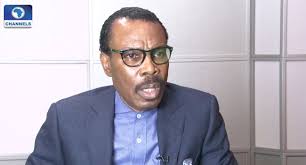
The Chief Executive Officer, Financial Derivatives Company (FDC), Bismark Rewane has undertaken critical assessment of Nigeria’s economic environment and observed that despite the current downturn and looming recession, the country would overcome its current challenges and emerge economically stronger in the post Covid -19 pandemic era.
Rewane, a member of Nigeria’s Economic Advisory Council also is of the opinion that it was inevitable for the country to experience yet another recession by end of the current year 2020 owing to impacts of the Covid – 19 global pandemic, adding that the country would emerge slowly from the recession into a solid economy going to end of Quarter 1 of 2022.
According to the financial expert, for these economic predictions to become reality, the Federal government must however adopt a number of fiscal policy measures including among other things a de-emphasis on over dependence on oil revenues and investments in areas of critical infrastructure notably health, education and transportation.
In addition, he suggested that government needed to ensure strict observance of the economic recovery and growth plans 1 and 2 which emphasizes concessioning of the nation’s airports, simplification of the country’s tax administration process, and full implementation of cost retentive tariffs and exchange rate adjustment as well as to block leakages in the system.
Rewane who appeared as special guest via an online media interactive program recently unfolded a comprehensive and detailed analysis of economic developmental trends in Nigeria, since the present democratic dispensation identified a link between what he called financial crisis and economic crisis pointing out however that Nigeria had witnessed an economic swing during the period between prosperity, austerity and economic recovery.
According to him, the country had witnessed two periods of recession since the 2008 global recessions, the one in 2016 brought about by the decline in the international oil market adding that the country overcome both recessions through a very slow but painful recovery process.
“In 2008 we had real buffers, if you take your external reserves minus your external debts. We had about $48 billion in 2008, we had about $14 billion of buffers. We were slim in 2016 and now we have no buffers anymore” he noted.
“Our ability to take the shocks in 2008 was much stronger, and the ability to take the shocks in 2016 was even less stronger than what we had in 2008, but now we don’t have any buffers. If anything we have more debts and the rest reserves”
He added that in terms of life expectancy indices, the country had fared increasingly better having moved from 51 years in 2008 while dealing with HIV health challenge to 52 years during the Ebola crisis and now at 53 years under Covid 19 pandemic.
He noted that while in 2010 the country recorded a GDP growth in the range of about $389 billion, the figures had gone up up to about $492 billion in 2018 due to economic adjustments programs by the government and that by end of current year 2020 GDP figures in the country would go as low as $344 billion as a result of the Covid-19 crisis..
He however expressed optimism that despite the present rise in prices of food commodities in the market, the nation’s food basket would get increasingly better owing to the fact that Nigerians are bound to work even harder and the economic shift would swing to areas of greater productive activity.



